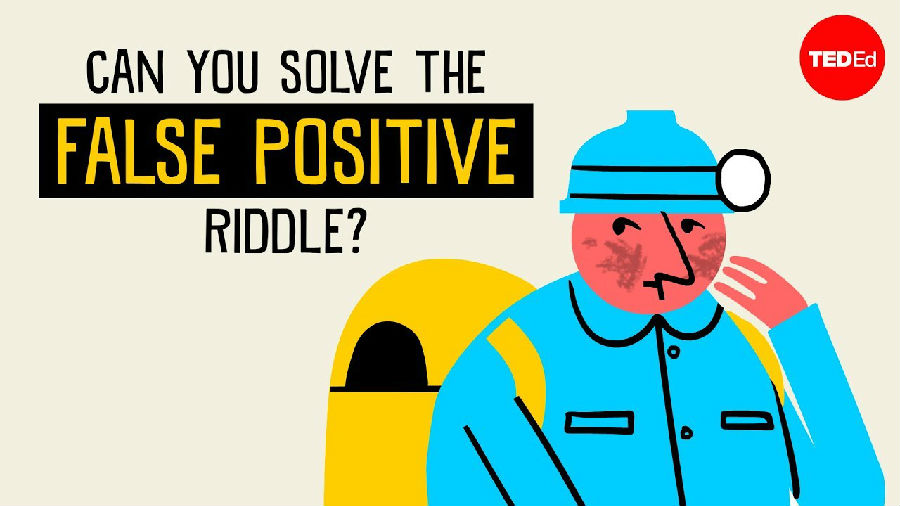(单词翻译:单击)
Mining unobtainium is hard work. The rare mineral appears in only 1% of rocks in the mine.
挖掘稀有元素是很难的事。稀有矿物仅仅存在于矿井中那1%的石头里。
But your friend Tricky Joe has something up his sleeve.
但是你的朋友,狡猾的乔,有他的秘密武器。
The unobtainium detector he's been perfecting for months is finally ready.
他改进了近几个月的稀有元素检测器终于准备完毕。
The device never fails to detect unobtainium if any is present.
如果有任何稀有元素存在,这个设备则一定会检测到。
Otherwise, it's still highly reliable, returning accurate readings 90% of the time.
在其他方面,它仍然是很可靠的:90%的几率它会有准确的读数。
On his first day trying it out in the field, the device goes off, and Joe happily places the rock in his cart.
在场地进行测试的第一天,设备响应了,乔高兴地把石头放在他的车里。
As the two of you head back to camp where the ore can be examined, Joe makes you an offer: he'll sell you the ore for just $200.
当你们两个返回营地,在那里矿石能得到检验,乔向你开了价:他可以将这块矿石以仅仅200美元卖给你。
You know that a piece of unobtanium that size would easily be worth $1000, but any other minerals would be effectively worthless.
你心里知道那种大小的稀有元素最少价值1000美元,但若是其他矿物,则一文不值。
Should you make the trade?
你应该做这笔交易吗?
Intuitively, it seems like a good deal.
直觉上,这似乎是个挺好的交易。
Since the detector is correct most of the time, shouldn't you be able to trust its reading? Unfortunately, no.
因为检测器大多时候都工作正常,为什么不去相信它的读数呢?很抱歉,答案是不。
Here's why. Imagine the mine has exactly 1,000 pieces of ore.
原因如下。假设你开采的矿正好有1000块矿石。
An unobtainium rarity of 1% means that there are only 10 rocks with the precious mineral inside.
难得素的稀有度为1%意味着,其中只有10块石头含有那种珍贵的矿物。
All 10 would set off the detector. But what about the other 990 rocks without unobtainium?
这10块石头都会引起检测器响应。但那其他990块不含稀有元素的石头呢?
Well, 90% of them, 891 rocks, to be exact, won't set off anything.
这些石头中的90%,确切来说就是891块石头,什么反应都不会引起。
But 10%, or 99 rocks, will set off the detector despite not having unobtanium, a result known as a false positive.
但10%(99块)其他的石头,都会引起检测器响应,无论含不含稀有元素,这个结果就是假正。
Why does that matter? Because it means that all in all, 109 rocks will have triggered the detector.
为什么这个会有影响呢?因为它意味着总共有109块石头触发了检测器。

And Joe's rock could be any one of them, from the 10 that contain the mineral to the 99 that don't,
而乔的那块石头可能是它们当中任意一个:可以是含有那种矿物的10块石头,也可以是那99块不含有的,
which means the chances of it containing unobtainium are 10 out of 109 -- about 9%.
也就是说含有稀有元素的石头几率是10/109,大约9%。
And paying $200 for a 9% chance of getting $1000 isn't great odds.
只有9%的几率获利1000,而你要为此付200,这并不划算。
So why is this result so unexpected, and why did Joe's rock seem like such a sure bet?
为什么这个结果如此出乎意料,为什么乔的石头似乎像一比划算的交易呢?
The key is something called the base rate fallacy.
答案在于“基本比率谬误”。
While we're focused on the relatively high accuracy of the detector,
当我们聚焦于检测器有着相对较高的精度时,
our intuition makes us forget to account for how rare the unobtanium was in the first place.
我们的直觉让我们忘记了去思考,稀有元素本来就是非常稀有的。
But because the device's error rate of 10% is still higher than the mineral's overall occurrence,
但由于设备10%的错误率,仍然高于矿物总体的出现率,
any time it goes off is still more likely to be a false positive than a real finding.
只要设备响应,仍有很大可能是假正,而不是真的发现了稀有元素。
This problem is an example of conditional probability.
这个问题是条件概率的一个例子。
The answer lies neither in the overall chance of finding unobtainium,
答案既不在于发现稀有元素的总体概率,
nor the overall chance of receiving a false positive reading.
也不在于收到误报的总体概率。
This kind of background information that we're given before anything happens is known as unconditional, or prior probability.
在一切事情发生前,先给我们的这种背景信息,就叫做无条件或者先验概率。
What we're looking for, though, is the chance of finding unobtainium once we know that the device did return a positive reading.
但我们寻求的是,在我们知道设备返回了一个正确的读数时,获得稀有元素的概率。
This is known as the conditional, or posterior probability,
这叫做条件或后验概率,
determined once the possibilities have been narrowed down through observation.
是由一旦通过观察将可能性降低所决定的。
Many people are confused by the false positive paradox
很多人困惑于假正悖论,
because we have a bias for focusing on specific information over the more general,
因为我们更偏向于将注意力集中在特定的信息,而不是更加一般的信息,
especially when immediate decisions come into play.
特别是需要马上做决定的时候。
And while in many cases it's better to be safe than sorry, false positives can have real negative consequences.
不过大多数时候,稳妥总比遗憾要好,假正会造成不良结果。
False positives in medical testing are preferable to false negatives, but they can still lead to stress or unnecessary treatment.
在医疗测试中,假正比假负更加可靠,但是它们仍然能导致压力或者不必要的治疗。
And false positives in mass surveillance can cause innocent people to be wrongfully arrested, jailed, or worse.
在大规模监控下,误报会导致无辜的人被逮捕、入狱或更糟。
As for this case, the one thing you can be positive about is that Tricky Joe is trying to take you for a ride.
至于这种情况,你能肯定的一点是:狡猾的乔正试图欺骗你。


